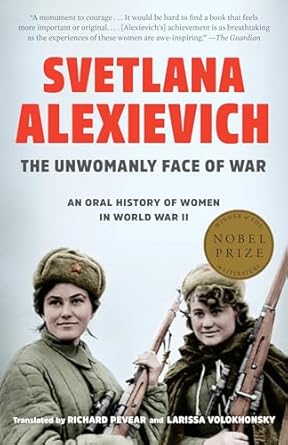After lots of reading and discussion about what oral history is, its possibilities and limits, Tucker’s reading for this week made me realise how difficult it is to manipulate an OH product in order to publish it as a book.
A few years ago, I read Svetlana Aleksiévitch’s The Unwomanly Face of War (first published in 1983), an astonishing book that presents the experiences of the Soviet women that fought in World War II collected by the author in OH interviews. Aleksiévitch’s work was structured in way different than Tucker’s: the Belarusian chose to start each chapter with a personal reflection either about her goals, what she heard, how she felt during the interviews and writing about them, and then transcripted a few long excerpts of the interviews, without a mediation in between. I did miss something else when I was reading it: what were her questions to those women? Did all of them start to talk and never stop or Aleksiévitch at some time needed to intervene?
I remember this now as I finished Swing Shift with a bunch of other questions: how did she choose those little quotes she decided to transcribe? Doesn’t the idea of creating a narrative comparing all the experiences make justice to the individuals and the hours spent talking about themselves? Translating a speech from an interview to a third-person objective narrative does not subvert the idea of the interviewed own agency?
That is not to say I dislike the book, even because the position assumed by Tucker seems to be a good example of how to successfully develop a OH project. If she wasn’t open to acknowledge misconceptions, shift her motive and to expand the project scope, she might have found herself “producing a separate history of skilled women instrumentalists” (p. 7), instead of addressing both gender and race as elements of power embedded in the swing discourse. The author’s focus in the 1940s provided national and international context to the women’s strategies and experiences during that time, and makes it possible for the reader to find parallels and ruptures between the life of black and white women in other roles.
My doubts are far from being critical; rather, I am just trying to figure out which way is better to present an OH interview in a commercial product, or what are the obstacles to each one of the strategies established. For me, it’s a paradigm: at the first sight, I would definitely say that using long quotations allows me to feel present to an extent, as if I could almost be a third person in the interview room and make the narrator feel seen and heard. After reading Tucker’s work, though, I believe it is safe to say her narration provides a meaning that would otherwise have been forgotten or taken as granted.

Bibliography
Sherrie Tucker, Swing Shift: “All-girl” Bands of the 1940s. Durham and London: Duke University Press, 2000.
Svetlana Aleksiévitch, A guerra não tem rosto de mulher. São Paulo: Companhia das Letras, 2013.